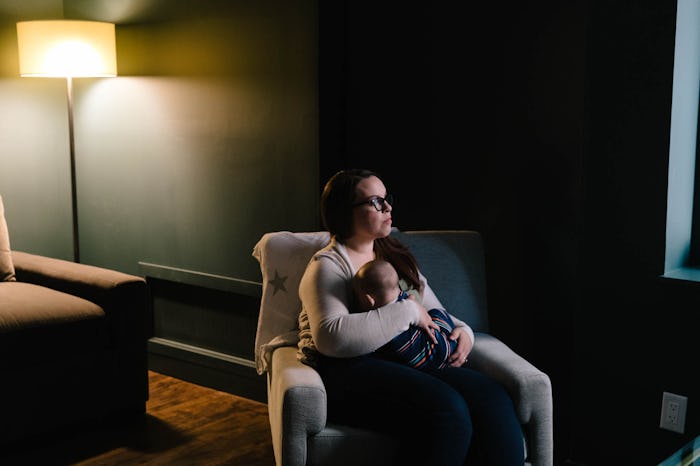Life
How To Have A Healthy Second Pregnancy After Suffering From PPD
I don't know if my husband and I will have a second child. But I would be lying if I didn't say that when I do consider it, I also think about my experience with postpartum depression (PPD) and anxiety. In the months that followed my daughter's birth, I was tethered to my deeply rooted fear, irrational thoughts, dizziness, nausea, and heart palpitations. I visited the emergency room twice for what I thought were heart attacks. It was a long road and makes me wonder, "Can I have a healthy second pregnancy after PPD?" It turns out, I'm not wrong to ask the question.
"If you have had a history of postpartum depression, this puts you at risk for getting it again during future pregnancies," Dr. Sherry Ross, an OB-GYN and women’s health expert at Providence Saint John’s Health Center in Santa Monica, California, tells Romper in an email interview. "The good news is that just because you had it once doesn’t mean you will get it in future pregnancies."
Ross explains that if you have a history of postpartum depression during your first pregnancy, there are preventative steps you can take during future pregnancies to avoid going through it a second time. She says seeing a therapist throughout the pregnancy is a crucial first step in taking control of your emotions. "It’s important to establish a support team who will help you be successful avoiding the dark days associated with depression," Ross says. "The team should include your partner, therapist, and healthcare provider. She says women at risk for PPD may also want to recruit a best friend, sibling, or parent to help them navigate "this emotionally terrifying time."
"Women suffering from this type of depression need to acknowledge and be communicative on how they are feeling and use their support team regularly," Ross adds.
E. Danielle Butler, a writer, speaker, and mom of two, tells Romper in an email interview that the fear of a repeat experience is something most couples don't talk about, even though they both know it's there. Like Ross, she recommends being proactive in having candid conversations with your partner, healthcare providers, and supportive friends and family. "Sometimes it helps just knowing that you have a voice and someone’s listening," she says.
Preparation, Butler says, is also key. "Even though we can’t plan how things go, having some tools at the ready prevent us from having to start from scratch," she says, relating it to carrying around cables in a car even if you don't know how to use them — "it's a comforting start."
Butler says a woman and her support team should create a plan for how she will communicate her fears and needs moving forward. "Identify the specific things that you and your support system will be on the lookout for in the next pregnancy and the months that follow."
Taking good care of yourself by eating healthy, sleeping seven to eight hours per night and exercising five times a week for 30 minutes also helps with the mind-body aspect of PPD, Ross says. "Antidepressants may also need to be started at 36 weeks of pregnancy in order to get adequate blood levels in a women’s system to ward off uncontrollable emotions once the baby is born," she notes.
As a whole, however, both women agree that a previous experience with PPD should not deter a woman from getting pregnant again. "Just like every child is different, every pregnancy and recovery is different," Butler says. "As you face your next pregnancies, recognize that your PPD experience will possibly be different and that’s OK. Be kind to yourself."
Check out Romper's new video series, Romper's Doula Diaries:
Check out the entire Romper's Doula Diaries series and other videos on Facebook and the Bustle app across Apple TV, Roku, and Amazon Fire TV.
